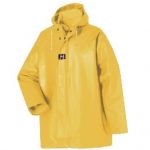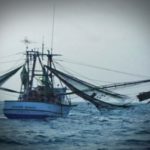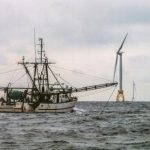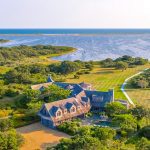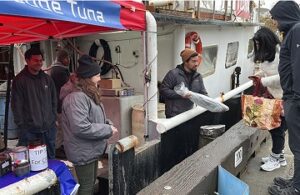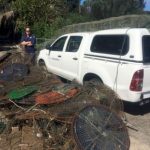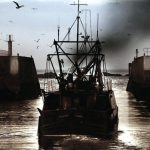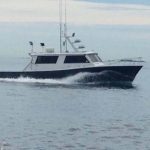Tag Archives: Alaska
Body of missing fisherman recovered along Captains Bay shoreline
 The Unalaska Fire and Police Departments, along with members of the U.S. Coast Guard and Alaska State Troopers recovered the body of missing fisherman Jacob Riley Veeser Saturday morning. 28-year-old Veeser was reported missing Friday afternoon. City officials said in a press release that evening that he was last seen at midnight on April 4 walking down the GI “dolphin” dock at the UniSea Inc. processing plant. Veeser, a crewmember aboard the F/V Lady Alaska, was discovered in the water along Captains Bay Rd. around 10:30 a.m. Saturday morning. more, >>CLICK TO READ<< 12:31
The Unalaska Fire and Police Departments, along with members of the U.S. Coast Guard and Alaska State Troopers recovered the body of missing fisherman Jacob Riley Veeser Saturday morning. 28-year-old Veeser was reported missing Friday afternoon. City officials said in a press release that evening that he was last seen at midnight on April 4 walking down the GI “dolphin” dock at the UniSea Inc. processing plant. Veeser, a crewmember aboard the F/V Lady Alaska, was discovered in the water along Captains Bay Rd. around 10:30 a.m. Saturday morning. more, >>CLICK TO READ<< 12:31
City of Unalaska in search of missing fisherman
 A 28-year-old fisherman was reported missing Friday in Unalaska. The City of Unalaska said in a press release that Jacob Riley Veeser was last seen at midnight on April 4 walking down the GI “dolphin” dock at the UniSea Inc. processing plant. Local police, fire and ports departments began a shoreline search for Veeser shortly before 7 p.m. Friday evening. The search was suspended around 10:30 last night and will pick back up again Saturday morning. The search team plans to use remotely operated vehicles to survey underwater. Veeser is described as a 6-foot, 200-pound white male with brown hair, brown eyes and a full beard and mustache. He is a crewmember on the F/V Lady Alaska. more, >>CLICK TO READ<< 09:08
A 28-year-old fisherman was reported missing Friday in Unalaska. The City of Unalaska said in a press release that Jacob Riley Veeser was last seen at midnight on April 4 walking down the GI “dolphin” dock at the UniSea Inc. processing plant. Local police, fire and ports departments began a shoreline search for Veeser shortly before 7 p.m. Friday evening. The search was suspended around 10:30 last night and will pick back up again Saturday morning. The search team plans to use remotely operated vehicles to survey underwater. Veeser is described as a 6-foot, 200-pound white male with brown hair, brown eyes and a full beard and mustache. He is a crewmember on the F/V Lady Alaska. more, >>CLICK TO READ<< 09:08
Chinook harvest limit down nearly 40 percent from last year
 The harvest allocation for king salmon in Southeast Alaska is lower than the region’s commercial trollers expected. The Alaska Department of Fish and Game announced Tuesday (4-1-25) that 130,800 treaty Chinook salmon will be available this year for all Southeast fisheries, down almost 40% from last year’s allocation. From that total, trollers are allowed to catch 92,700 king salmon. The balance of treaty salmon goes primarily to sport anglers. Sitkan Matt Donohoe is the vice chair of the Alaska Trollers Association. “We heard that it’s going to be lower than last year, but we didn’t know how much,” “It’s a devastating number. It’s the worst ever. I mean, what industry can afford a 40% reduction?” more, >>CLICK TO READ<< 19:11
The harvest allocation for king salmon in Southeast Alaska is lower than the region’s commercial trollers expected. The Alaska Department of Fish and Game announced Tuesday (4-1-25) that 130,800 treaty Chinook salmon will be available this year for all Southeast fisheries, down almost 40% from last year’s allocation. From that total, trollers are allowed to catch 92,700 king salmon. The balance of treaty salmon goes primarily to sport anglers. Sitkan Matt Donohoe is the vice chair of the Alaska Trollers Association. “We heard that it’s going to be lower than last year, but we didn’t know how much,” “It’s a devastating number. It’s the worst ever. I mean, what industry can afford a 40% reduction?” more, >>CLICK TO READ<< 19:11
Alaskan Communities Use Flexibility in Snow Crab Fishery Alaskan Communities for Economic Relief
 The Alaska Bering Sea snow crab fishery is open for the first time in 2 years after a sharp decline in the crab population caused fishery closures. Participants have banded together with NOAA Fisheries to use regulatory flexibilities to help the fishery operate smoothly. While the species shows signs of recovery, it is still in low abundance. There are continued challenges for harvesters, processors, and small coastal communities who depend on the fishery for their income and way of life. We estimate that more than 10 billion snow crabs disappeared from the Bering Sea from 2018 to 2021 due to a marine heatwave and ecological shifts in the region. The snow crab fishery is an important economic driver in Alaska, generating an average of $150 million annually from 2012 to 2021. Disaster relief funding from the Department of Commerce in 2022–2023 provided some assistance to fishing communities. more, >>CLICK TO READ<< 11:47
The Alaska Bering Sea snow crab fishery is open for the first time in 2 years after a sharp decline in the crab population caused fishery closures. Participants have banded together with NOAA Fisheries to use regulatory flexibilities to help the fishery operate smoothly. While the species shows signs of recovery, it is still in low abundance. There are continued challenges for harvesters, processors, and small coastal communities who depend on the fishery for their income and way of life. We estimate that more than 10 billion snow crabs disappeared from the Bering Sea from 2018 to 2021 due to a marine heatwave and ecological shifts in the region. The snow crab fishery is an important economic driver in Alaska, generating an average of $150 million annually from 2012 to 2021. Disaster relief funding from the Department of Commerce in 2022–2023 provided some assistance to fishing communities. more, >>CLICK TO READ<< 11:47
Russia’s ongoing war on Alaska fishermen
 These are tough times for Alaska’s fishermen, and Russia is a primary cause. During his recent confirmation hearing, Commerce Secretary Howard Lutnick joked with Alaska Sen. Dan Sullivan about the need to counter “communist fish.” In reality, the future of our entire industry could hinge on whether Secretary Lutnick succeeds. For more than a decade, the Kremlin has been implementing policies that take direct aim at Alaska’s fishing sector. In 2014, Russia banned U.S. seafood imports, choking off a $60 million market for Alaska fishermen, with pink salmon roe hit especially hard. In direct response, ex-vessel prices for pink salmon declined from $0.42 per pound to $0.23 per pound in 2015. By Matt Alward. more, >>CLICK TO READ<< 07:18
These are tough times for Alaska’s fishermen, and Russia is a primary cause. During his recent confirmation hearing, Commerce Secretary Howard Lutnick joked with Alaska Sen. Dan Sullivan about the need to counter “communist fish.” In reality, the future of our entire industry could hinge on whether Secretary Lutnick succeeds. For more than a decade, the Kremlin has been implementing policies that take direct aim at Alaska’s fishing sector. In 2014, Russia banned U.S. seafood imports, choking off a $60 million market for Alaska fishermen, with pink salmon roe hit especially hard. In direct response, ex-vessel prices for pink salmon declined from $0.42 per pound to $0.23 per pound in 2015. By Matt Alward. more, >>CLICK TO READ<< 07:18
Fishermen want to go green but say DOGE cuts prevent that
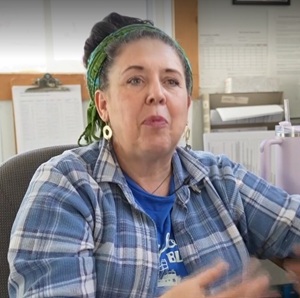 Commercial fishermen and seafood processors and distributors looking to switch to new, lower-carbon emission systems say the federal funding they relied on for this work is either frozen or unavailable due to significant budget cuts promoted by President Donald Trump’s Department of Government Efficiency. The changes are designed to replace old diesel-burning engines and outdated at-sea cooling systems and are touted by environmentalists as a way to reduce seafood’s carbon footprint. Salmon harvesters in Washington state, scallop distributors in Maine and halibut fishermen in Alaska are among those who told The Associated Press their federal commitments for projects like new boat engines and refrigeration systems have been rescinded or are under review. Photos, video, more, >>CLICK TO READ<< 10:51
Commercial fishermen and seafood processors and distributors looking to switch to new, lower-carbon emission systems say the federal funding they relied on for this work is either frozen or unavailable due to significant budget cuts promoted by President Donald Trump’s Department of Government Efficiency. The changes are designed to replace old diesel-burning engines and outdated at-sea cooling systems and are touted by environmentalists as a way to reduce seafood’s carbon footprint. Salmon harvesters in Washington state, scallop distributors in Maine and halibut fishermen in Alaska are among those who told The Associated Press their federal commitments for projects like new boat engines and refrigeration systems have been rescinded or are under review. Photos, video, more, >>CLICK TO READ<< 10:51
As Alaska’s crab industry struggles, herring fishermen are losing their market
 Captain Dan Veerhusen and Jan, his wife, run the F/V Taurus, one of the few remaining boats that still fish herring in the Bering Sea. Last summer, in Sand Point, the couple were preparing the 58-foot seiner for what would be Veerhusen’s 30th-or-so season. He’s been fishing herring since 1988, when Unalaska’s Port of Dutch Harbor was at the center of a multimillion-dollar crab boom. “I love herring fishing. It’s real fishing.” he said. “It was a regular, competitive fishery back then. But these days, there’s ourselves, another boat, maybe three boats out there.” The herring fishery in the Bering Sea boomed in the early 20th century but struggled after World War II as Americans lost their appetite for the fish. Demand increased again in the 1970s when the Bering Sea crab industry took off, creating a demand for herring as baitfish. links, more, >>CLICK TO READ<< 16:50
Captain Dan Veerhusen and Jan, his wife, run the F/V Taurus, one of the few remaining boats that still fish herring in the Bering Sea. Last summer, in Sand Point, the couple were preparing the 58-foot seiner for what would be Veerhusen’s 30th-or-so season. He’s been fishing herring since 1988, when Unalaska’s Port of Dutch Harbor was at the center of a multimillion-dollar crab boom. “I love herring fishing. It’s real fishing.” he said. “It was a regular, competitive fishery back then. But these days, there’s ourselves, another boat, maybe three boats out there.” The herring fishery in the Bering Sea boomed in the early 20th century but struggled after World War II as Americans lost their appetite for the fish. Demand increased again in the 1970s when the Bering Sea crab industry took off, creating a demand for herring as baitfish. links, more, >>CLICK TO READ<< 16:50
Poopdeck: Nearly a century of adventure — Part 6
 Clarence Hiram “Poopdeck” Platt said he didn’t quit commercial fishing because he was too old or couldn’t handle the workload anymore. He quit because he didn’t feel like doing it anymore. In a 1992 interview with KBBI public radio in Homer, he explained his actions: “I (had) really enjoyed fishing, but all of a sudden, for some reason or other, it quit being fun. I wasn’t enjoying it. I wasn’t looking forward to it. I was dreading it … and I said that’s enough. So, I sold out to my grandson (Erik Huebsch, in 1984) my boat, permit, gear and the whole works…. I haven’t regretted quitting at all.” Despite the diminishment of joy Poopdeck felt as he entered retirement, he loved his long tenure as a fisherman. more, >>CLICK TO READ<< 09:40
Clarence Hiram “Poopdeck” Platt said he didn’t quit commercial fishing because he was too old or couldn’t handle the workload anymore. He quit because he didn’t feel like doing it anymore. In a 1992 interview with KBBI public radio in Homer, he explained his actions: “I (had) really enjoyed fishing, but all of a sudden, for some reason or other, it quit being fun. I wasn’t enjoying it. I wasn’t looking forward to it. I was dreading it … and I said that’s enough. So, I sold out to my grandson (Erik Huebsch, in 1984) my boat, permit, gear and the whole works…. I haven’t regretted quitting at all.” Despite the diminishment of joy Poopdeck felt as he entered retirement, he loved his long tenure as a fisherman. more, >>CLICK TO READ<< 09:40
Gov. Dunleavy requests five new fishery disasters including Kodiak’s 2024 pink salmon season
 On Jan. 30 Governor Mike Dunleavy submitted five new requests for federal fisheries disaster assistance for last summer’s salmon season. That includes commercial salmon fisheries on the Alaska Peninsula, Kodiak, Chignik, Lower Cook Inlet and Prince William Sound. The state accounts for roughly half, 26 out of 53, of the fishery disasters declared around the country since 2020, which include a variety of species like salmon, crab and Pacific cod. In Kodiak, fishermen harvested 7.6 million pinks last summer, which was less than 40% percent of the ten-year average of 20.4 million fish. That meant last summer was one of the lowest valued commercial pink salmon seasons on record for Kodiak Island. more, >>CLICK TO READ<< 07:57
On Jan. 30 Governor Mike Dunleavy submitted five new requests for federal fisheries disaster assistance for last summer’s salmon season. That includes commercial salmon fisheries on the Alaska Peninsula, Kodiak, Chignik, Lower Cook Inlet and Prince William Sound. The state accounts for roughly half, 26 out of 53, of the fishery disasters declared around the country since 2020, which include a variety of species like salmon, crab and Pacific cod. In Kodiak, fishermen harvested 7.6 million pinks last summer, which was less than 40% percent of the ten-year average of 20.4 million fish. That meant last summer was one of the lowest valued commercial pink salmon seasons on record for Kodiak Island. more, >>CLICK TO READ<< 07:57

Guest writers: Bellingham’s SE Alaska salmon fleet threatened by lawsuits, misinformation
We appreciated Ed Johnston’s opinion editorial on Feb. 19, calling for cooperation in how we manage our salmon fisheries under the Pacific Salmon Treaty. As Washingtonians and Alaskans, we know that our shared Pacific salmon fisheries must be managed in a manner that considers how interceptions of salmon bound for distant watersheds may impact ecosystems, salmon populations and communities coastwide. That is why Washington sits alongside Alaska — as well as Canada — at the negotiating table under the Pacific Salmon Treaty. In order for our salmon and people to thrive, interceptions of salmon between the two countries must be managed using sound science and a cooperative approach. Our commitment to cooperative management and working collaboratively under the Pacific Salmon Treaty is as strong as our commitment to sustainable fishing livelihoods. more, >>CLICK TO READ<< 08:24
NOAA firings hit crucial Alaska weather service, fishery research
 Alaskans were among the hundreds of National Oceanic and Atmospheric Administration employees who began receiving firing notices this week, a blow to an agency that provides everything from weather forecasts to fisheries management to cutting-edge climate science in Alaska. The cuts — part of a broader effort by the administration of President Donald Trump to drastically slash the federal workforce — came after other agencies, including the National Park Service, had abruptly fired probationary workers in recent weeks. Nationally, more than 800 people across NOAA, an organization of 13,000 staff members, were fired, the New York Times reported Thursday. In Alaska, it was not immediately clear how many had lost their jobs, but they included NOAA employees working on fishery research and weather monitoring, among other functions. Photos, more, >>CLICK TO READ<< 10:21
Alaskans were among the hundreds of National Oceanic and Atmospheric Administration employees who began receiving firing notices this week, a blow to an agency that provides everything from weather forecasts to fisheries management to cutting-edge climate science in Alaska. The cuts — part of a broader effort by the administration of President Donald Trump to drastically slash the federal workforce — came after other agencies, including the National Park Service, had abruptly fired probationary workers in recent weeks. Nationally, more than 800 people across NOAA, an organization of 13,000 staff members, were fired, the New York Times reported Thursday. In Alaska, it was not immediately clear how many had lost their jobs, but they included NOAA employees working on fishery research and weather monitoring, among other functions. Photos, more, >>CLICK TO READ<< 10:21
Remembering Mason Evich: GoFundMe set up for Fairhaven man killed in head-on crash
 Friends and family of 28-year-old Mason Evich remember him as someone who will be deeply missed by all who had the privilege of knowing him. The commercial fisherman tragically lost his life in a head-on crash on the New Bedford-Fairhaven Bridge on Feb. 20, and heartfelt tributes are flooding in to honor his memory. A GoFundMe, Honoring Mason’s Life with Love, was started by Ryley Santos as a tribute to Evich. To date it has raised more than $58,000, exceeding the initial $25,000 goal. A group of friends got together and wrote a tribute to Evich on GoFundMe. Links, more, >>CLICK TO READ 06:53
Friends and family of 28-year-old Mason Evich remember him as someone who will be deeply missed by all who had the privilege of knowing him. The commercial fisherman tragically lost his life in a head-on crash on the New Bedford-Fairhaven Bridge on Feb. 20, and heartfelt tributes are flooding in to honor his memory. A GoFundMe, Honoring Mason’s Life with Love, was started by Ryley Santos as a tribute to Evich. To date it has raised more than $58,000, exceeding the initial $25,000 goal. A group of friends got together and wrote a tribute to Evich on GoFundMe. Links, more, >>CLICK TO READ 06:53
Commercial Fisherman Mason C. Evich, 28, of Fairhaven died February 20, 2025. He was a devoted son, brother, and loyal friend.
 He was everything wonderful. If you were lucky enough to know Mason, you LOVED him. A beacon of kindness, with a gentle soul that touched everyone he met, the pain we feel in losing him is indescribable. Born in Seattle, Washington, Mason was the loving son of Dagne (Sovik) Evich and the late Adam Evich. Mason’s love for fishing was passed down from his father, a lifelong commercial fisherman. Each summer, Mason accompanied his dad to Bristol Bay, Alaska, where they salmon fished together on the family’s fishing vessel. After graduating from Fairhaven High School, Mason attended the Northeast Maritime Institute, where he earned his associate degree and captain’s license. He later worked as a mate on commercial fishing vessels out of Cape May, NJ, and New Bedford, MA. more, >>CLICK TO READ<< 14:28
He was everything wonderful. If you were lucky enough to know Mason, you LOVED him. A beacon of kindness, with a gentle soul that touched everyone he met, the pain we feel in losing him is indescribable. Born in Seattle, Washington, Mason was the loving son of Dagne (Sovik) Evich and the late Adam Evich. Mason’s love for fishing was passed down from his father, a lifelong commercial fisherman. Each summer, Mason accompanied his dad to Bristol Bay, Alaska, where they salmon fished together on the family’s fishing vessel. After graduating from Fairhaven High School, Mason attended the Northeast Maritime Institute, where he earned his associate degree and captain’s license. He later worked as a mate on commercial fishing vessels out of Cape May, NJ, and New Bedford, MA. more, >>CLICK TO READ<< 14:28

Top Alaska House legislators reject plan to allow fish farms
Two leading members of the Alaska House of Representatives on Monday announced their opposition to a proposal from Gov. Mike Dunleavy to lift the state’s 35-year-old ban on fish farms. In a written statement, Speaker of the House Bryce Edgmon, I-Dillingham, and House Rules Committee Chair Louise Stutes, R-Kodiak, said the bill will not aid the state’s commercial fishing industry. Stutes also chairs the House Fisheries Committee, and Edgmon is the committee’s vice chair; without their support, House Bill 111 is unlikely to advance. Dunleavy has proposed keeping a ban on salmon farming but is seeking permission for farming other types of fish. Alaska has banned all types of fish farming for decades under the belief that allowing farming poses social and environmental risks to the state’s wild fish. more, >>CLICK TO READ<< 11:11
How a Risky State Investment in Seafood Cost Alaskans Millions and left a Fishing Town in Crisis
 Last summer, an unsettling quiet cloaked the isolated Southwest Alaska community of King Cove as the town’s economic engine — a sprawling seafood processing plant — sat shuttered. Bunkhouses, once filled with hundreds of workers during the peak salmon harvest, were vacant. Four diesel generators that had rumbled day and night were stilled. The plant docks, once lined with boats and circled by fish-scavenging gulls, were empty. The closure resulted from the financial implosion of the plant’s owner, Peter Pan Seafood. Some local fishing boat captains directed their ire at company leaders who accepted their seafood, then failed to pay them. They dwelled far less on a surprising, largely silent, powerhouse investor in the plant: the state of Alaska. Photos, more, >>CLICK TO READ<< 12:41
Last summer, an unsettling quiet cloaked the isolated Southwest Alaska community of King Cove as the town’s economic engine — a sprawling seafood processing plant — sat shuttered. Bunkhouses, once filled with hundreds of workers during the peak salmon harvest, were vacant. Four diesel generators that had rumbled day and night were stilled. The plant docks, once lined with boats and circled by fish-scavenging gulls, were empty. The closure resulted from the financial implosion of the plant’s owner, Peter Pan Seafood. Some local fishing boat captains directed their ire at company leaders who accepted their seafood, then failed to pay them. They dwelled far less on a surprising, largely silent, powerhouse investor in the plant: the state of Alaska. Photos, more, >>CLICK TO READ<< 12:41
Fishery managers start a process to tighten salmon bycatch rules in Alaska’s Bering Sea
 Federal fishery managers took steps on Tuesday to impose new rules to prevent Alaska chum salmon from being scooped into nets used to catch Bering Sea pollock, an industrial-scale fishery that makes up the nation’s largest single-species commercial seafood harvest. The North Pacific Fishery Management Council advanced a suite of new protections intended to combat the pollock trawlers’ salmon bycatch, the term for the incidental catch of unintended species. Proposed steps in the package include numeric caps on total chum salmon bycatch, with varying allocations for different sectors of the pollock fleet; protective limits in corridors known to be used by salmon migrating through the ocean back to Western Alaska freshwater spawning areas; and provisions that would link new limits in the ocean to real-time salmon counts and conditions in the rivers. more, >>CLICK TO READ<< 12:31
Federal fishery managers took steps on Tuesday to impose new rules to prevent Alaska chum salmon from being scooped into nets used to catch Bering Sea pollock, an industrial-scale fishery that makes up the nation’s largest single-species commercial seafood harvest. The North Pacific Fishery Management Council advanced a suite of new protections intended to combat the pollock trawlers’ salmon bycatch, the term for the incidental catch of unintended species. Proposed steps in the package include numeric caps on total chum salmon bycatch, with varying allocations for different sectors of the pollock fleet; protective limits in corridors known to be used by salmon migrating through the ocean back to Western Alaska freshwater spawning areas; and provisions that would link new limits in the ocean to real-time salmon counts and conditions in the rivers. more, >>CLICK TO READ<< 12:31
Fire at Sand Point Trident plant halts operations, leaves locals without fuel
 Sand Point is without access to fuel after a fire broke out at the local Trident Seafoods plant. The fire started early Thursday morning, pausing the processor’s operations, including its fuel sales, which the small eastern Aleutian community relies on. Sand Point Police Chief Benjamin Allen said the lack of fuel is the biggest concern at the moment. “Nobody can get gas right now,” Allen said. “[Trident] has to get clearance from the Coast Guard before they can start the gas pumps back up again.” “During the incident, their generator threw a connecting rod out the side of the engine block and it ruptured the fuel line to the generator,” Allen said. “And there was a good bit of diesel on the surface of the water that Trident’s been cleaning up.” more, >>CLICK TO READ<< 13:28
Sand Point is without access to fuel after a fire broke out at the local Trident Seafoods plant. The fire started early Thursday morning, pausing the processor’s operations, including its fuel sales, which the small eastern Aleutian community relies on. Sand Point Police Chief Benjamin Allen said the lack of fuel is the biggest concern at the moment. “Nobody can get gas right now,” Allen said. “[Trident] has to get clearance from the Coast Guard before they can start the gas pumps back up again.” “During the incident, their generator threw a connecting rod out the side of the engine block and it ruptured the fuel line to the generator,” Allen said. “And there was a good bit of diesel on the surface of the water that Trident’s been cleaning up.” more, >>CLICK TO READ<< 13:28
In memory of Martin “Skooky” Parsons
 Martin Parsons, born Nov. 6, 1937, in Cordova, Alaska, passed away peacefully on Jan. 11, 2025, in Kirkland Washington, at the age of 87 where he lived a “Hell of a life!” He was known affectionately as “Skooky,” a nickname given by the Arvidson family when he was a kid, which stuck with him throughout his life. He was loved, cherished, and respected by his family and countless friends. Born of Scandinavian and Aleut descent, he was the son of Martin and May Parsons. Skooky lived in Alice Cove, grew up in Cordova, and graduated from Cordova High School. Following his education, he enlisted in the Army before returning to Cordova to pursue a career as a commercial fisherman. He spent many years gillnetting on the Copper River Flats and seining in Prince William Sound, embodying the hardworking spirit of Alaska’s fishing community. He was well known for his “marker sets” in Castle, or “round hauling” dogs in Sheep Bay. By Martin Parsons, Jr. more, >>CLICK TO READ<< 08:04
Martin Parsons, born Nov. 6, 1937, in Cordova, Alaska, passed away peacefully on Jan. 11, 2025, in Kirkland Washington, at the age of 87 where he lived a “Hell of a life!” He was known affectionately as “Skooky,” a nickname given by the Arvidson family when he was a kid, which stuck with him throughout his life. He was loved, cherished, and respected by his family and countless friends. Born of Scandinavian and Aleut descent, he was the son of Martin and May Parsons. Skooky lived in Alice Cove, grew up in Cordova, and graduated from Cordova High School. Following his education, he enlisted in the Army before returning to Cordova to pursue a career as a commercial fisherman. He spent many years gillnetting on the Copper River Flats and seining in Prince William Sound, embodying the hardworking spirit of Alaska’s fishing community. He was well known for his “marker sets” in Castle, or “round hauling” dogs in Sheep Bay. By Martin Parsons, Jr. more, >>CLICK TO READ<< 08:04
Bering Sea snow crab season kicks off for first time in three years
 Earlier this month, commercial snow crabs started hitting Unalaska’s docks again, for the first time in nearly three years. The Bering Sea snow crab fishery reopened in mid-October, after billions of the crab disappeared and the fishery was shut down in October 2022. This season’s first catch was delivered on Jan. 15. Opilio, or snow crab, is generally fished in the new year and into the early spring. The season runs through May. Alaska Department of Fish and Game Area Management Biologist Ethan Nichols said nine vessels are actively participating in the Bering Sea commercial fishery. “The fleet is just getting started, for the most part,” Nichols said. “Fishing so far — the reports from the grounds — there seems to be good numbers of nice, new shell, large snow crab on the far northern portions of the grounds.” more, >>CLICK TO READ<< 15:06
Earlier this month, commercial snow crabs started hitting Unalaska’s docks again, for the first time in nearly three years. The Bering Sea snow crab fishery reopened in mid-October, after billions of the crab disappeared and the fishery was shut down in October 2022. This season’s first catch was delivered on Jan. 15. Opilio, or snow crab, is generally fished in the new year and into the early spring. The season runs through May. Alaska Department of Fish and Game Area Management Biologist Ethan Nichols said nine vessels are actively participating in the Bering Sea commercial fishery. “The fleet is just getting started, for the most part,” Nichols said. “Fishing so far — the reports from the grounds — there seems to be good numbers of nice, new shell, large snow crab on the far northern portions of the grounds.” more, >>CLICK TO READ<< 15:06
Stakes high for Alaska communities as “A” season for wild Alaska pollock opens
 The “A” Season for wild Alaska pollock officially opened on January 20, and the stakes couldn’t be higher for thousands of Alaskans. The fishery, one of the largest and most sustainable in the world, is more than a hallmark of responsible resource management—it serves as a lifeline for coastal communities and is a key driver of the state’s economy. “A” season is a make-or-break time for Unalaska, Kodiak and other fishing communities and will determine whether they thrive or stare down an uncertain future. Crews are gearing up for weeks at sea, while local businesses work around-the-clock to supply vessels with fuel, equipment, and provisions. This moment is critical not only for the pollock fishery but for the survival of the towns that depend on it to sustain their workforce, families and their future. more, >>CLICK TO READ<< 09:36
The “A” Season for wild Alaska pollock officially opened on January 20, and the stakes couldn’t be higher for thousands of Alaskans. The fishery, one of the largest and most sustainable in the world, is more than a hallmark of responsible resource management—it serves as a lifeline for coastal communities and is a key driver of the state’s economy. “A” season is a make-or-break time for Unalaska, Kodiak and other fishing communities and will determine whether they thrive or stare down an uncertain future. Crews are gearing up for weeks at sea, while local businesses work around-the-clock to supply vessels with fuel, equipment, and provisions. This moment is critical not only for the pollock fishery but for the survival of the towns that depend on it to sustain their workforce, families and their future. more, >>CLICK TO READ<< 09:36
Fishing vessel pulled free from rocks, Coast Guard begins investigation
 Unalaska’s U.S. Coast Guard Marine Safety Unit is investigating a fishing vessel that ran aground near Iliuliuk Bay. The F/V Northern Endurance was partially beached about three miles from downtown Unalaska, near Little Priest Rock on Thursday and was pulled free by the emergency response and salvage company Resolve Marine Friday morning around 9 a.m., according to Commanding Officer Lt. Lawrence Schalles.The City of Unalaska Fire Department initially responded to the incident Thursday afternoon, before handing operations over to the local Coast Guard team. “The on-scene commander contacted the vessel captain and confirmed there were no injuries to crew members aboard, as well as no additional hazardous conditions,” the Fire Department said in a statement. more, >>CLICK TO READ<< 06:06
Unalaska’s U.S. Coast Guard Marine Safety Unit is investigating a fishing vessel that ran aground near Iliuliuk Bay. The F/V Northern Endurance was partially beached about three miles from downtown Unalaska, near Little Priest Rock on Thursday and was pulled free by the emergency response and salvage company Resolve Marine Friday morning around 9 a.m., according to Commanding Officer Lt. Lawrence Schalles.The City of Unalaska Fire Department initially responded to the incident Thursday afternoon, before handing operations over to the local Coast Guard team. “The on-scene commander contacted the vessel captain and confirmed there were no injuries to crew members aboard, as well as no additional hazardous conditions,” the Fire Department said in a statement. more, >>CLICK TO READ<< 06:06
Fishing vessel runs aground near Unalaska’s landfill, no injuries reported
 Unalaska’s U.S. Coast Guard Marine Safety Unit is responding to a distressed vessel near the island’s landfill. The F/V Northern Endurance ran aground near Iliuliuk Bay along Summer Bay Road sometime Thursday morning. The Unalaska Fire Department responded to the incident around noon. “The on-scene commander contacted the vessel captain and confirmed there were no injuries to crew members aboard, as well as no additional hazardous conditions,” the Fire Department said in a statement. more, >>CLICK TO READ<< 09:25
Unalaska’s U.S. Coast Guard Marine Safety Unit is responding to a distressed vessel near the island’s landfill. The F/V Northern Endurance ran aground near Iliuliuk Bay along Summer Bay Road sometime Thursday morning. The Unalaska Fire Department responded to the incident around noon. “The on-scene commander contacted the vessel captain and confirmed there were no injuries to crew members aboard, as well as no additional hazardous conditions,” the Fire Department said in a statement. more, >>CLICK TO READ<< 09:25
Big Mountain Royalty McKenna Peterson’s Double Life as a Commercial Fishing Boat Captain
 McKenna Peterson has come a long way from her path as a professional ballerina in college. Since then, she’s called Utah, Seattle, Idaho, and Alaska home. She’s gained a reputation as a professional skier charging big mountain lines. She’s also Captain of the F/V Atlantis, spending her summers calling the shots on her family’s commercial fishing vessel in southeast Alaska. The best part is she does it all with an unassuming smirk on her face. I’ve seen it firsthand during a trip to Chile together. I’m a big fan of McKenna P., I’ll throw her name in the hat as one of the finest big mountain skiers to date. McKenna skis professionally for K2, Scott Sports, Xtratuf, KAVU, Ridge Merino. Let’s dig into all things McKenna in the interview below. Video, photos, more, >>CLICK TO READ<< 14:30
McKenna Peterson has come a long way from her path as a professional ballerina in college. Since then, she’s called Utah, Seattle, Idaho, and Alaska home. She’s gained a reputation as a professional skier charging big mountain lines. She’s also Captain of the F/V Atlantis, spending her summers calling the shots on her family’s commercial fishing vessel in southeast Alaska. The best part is she does it all with an unassuming smirk on her face. I’ve seen it firsthand during a trip to Chile together. I’m a big fan of McKenna P., I’ll throw her name in the hat as one of the finest big mountain skiers to date. McKenna skis professionally for K2, Scott Sports, Xtratuf, KAVU, Ridge Merino. Let’s dig into all things McKenna in the interview below. Video, photos, more, >>CLICK TO READ<< 14:30
Video: Coast Guard, others rescue 2 fishermen near Kodiak, Alaska
 The Coast Guard rescued two fishermen after their vessel capsized near Kodiak Wednesday afternoon. Watchstanders at the 17th Coast Guard District Command Center received a distress alert from the fishing vessel F/V Tanusha’s emergency position indicating radio beacon at 9:48 a.m. Wednesday. Watchstanders directed the launch of a helicopter aircrew from Coast Guard Air Station Kodiak and requested assistance from the Alaska State Troopers. The watchstanders also made attempts to contact vessels near the location of the distress signal via radio. Crewmembers aboard the fishing vessel F/V Victory received the request for assistance and navigated towards Tanusha’s last known location. The crew of the Victory located the Tanusha capsized and two fishermen in a life raft. A Coast Guard MH-60 Jayhawk helicopter aircrew hoisted the two fishermen with the help of the Alaska State Trooper vessel Stimson, and transported them to awaiting emergency medical services personnel in Kodiak in stable condition. Video, more, >>CLICK TO READ<< 18:38
The Coast Guard rescued two fishermen after their vessel capsized near Kodiak Wednesday afternoon. Watchstanders at the 17th Coast Guard District Command Center received a distress alert from the fishing vessel F/V Tanusha’s emergency position indicating radio beacon at 9:48 a.m. Wednesday. Watchstanders directed the launch of a helicopter aircrew from Coast Guard Air Station Kodiak and requested assistance from the Alaska State Troopers. The watchstanders also made attempts to contact vessels near the location of the distress signal via radio. Crewmembers aboard the fishing vessel F/V Victory received the request for assistance and navigated towards Tanusha’s last known location. The crew of the Victory located the Tanusha capsized and two fishermen in a life raft. A Coast Guard MH-60 Jayhawk helicopter aircrew hoisted the two fishermen with the help of the Alaska State Trooper vessel Stimson, and transported them to awaiting emergency medical services personnel in Kodiak in stable condition. Video, more, >>CLICK TO READ<< 18:38
Local fishing boats depart for Alaska
 A number of the larger commercial fishing boats that call Newport’s Yaquina Bay their home headed out last week for the annual trek to Alaska’s Bering Sea. It can take eight to 10 days for them to make the journey up north, depending on the weather. Boats from Newport will be docking either at Dutch Harbor or Kodiak, where they will be based while fishing for pollack and cod, a fishery that generally lasts for several months. The Port of Newport’s International Terminal was hopping with activity last week as boat owners and their crews made final preparations. Photos, more, >>CLICK TO READ<< 06:32
A number of the larger commercial fishing boats that call Newport’s Yaquina Bay their home headed out last week for the annual trek to Alaska’s Bering Sea. It can take eight to 10 days for them to make the journey up north, depending on the weather. Boats from Newport will be docking either at Dutch Harbor or Kodiak, where they will be based while fishing for pollack and cod, a fishery that generally lasts for several months. The Port of Newport’s International Terminal was hopping with activity last week as boat owners and their crews made final preparations. Photos, more, >>CLICK TO READ<< 06:32
Legislative task force offers possible actions to rescue troubled Alaska seafood industry
 Alaska lawmakers from fishing-dependent communities say they have ideas for ways to rescue the state’s beleaguered seafood industry, with a series of bills likely to follow. Members of a legislative task force created last spring now have draft recommendations that range from the international level, where they say marketing of Alaska fish can be much more robust, to the hyper-local level, where projects like shared community cold-storage facilities can cut costs. The draft was reviewed at a two-day hearing in Anchorage Thursday and Friday of the Joint Legislative Task Force Evaluating Alaska’s Seafood Industry. It will be refined in the coming days, members said. The bill that created the task force, Senate Concurrent Resolution 10, sets a deadline for a report to the full Legislature of Jan. 21, which is the scheduled first day of the session. However, a final task force report may take a little longer and be submitted as late as Feb. 1, said Senate President Gary Stevens, R-Kodiak, the group’s chair. Photos, links, more, >>CLICK TO READ<< 10:44
Alaska lawmakers from fishing-dependent communities say they have ideas for ways to rescue the state’s beleaguered seafood industry, with a series of bills likely to follow. Members of a legislative task force created last spring now have draft recommendations that range from the international level, where they say marketing of Alaska fish can be much more robust, to the hyper-local level, where projects like shared community cold-storage facilities can cut costs. The draft was reviewed at a two-day hearing in Anchorage Thursday and Friday of the Joint Legislative Task Force Evaluating Alaska’s Seafood Industry. It will be refined in the coming days, members said. The bill that created the task force, Senate Concurrent Resolution 10, sets a deadline for a report to the full Legislature of Jan. 21, which is the scheduled first day of the session. However, a final task force report may take a little longer and be submitted as late as Feb. 1, said Senate President Gary Stevens, R-Kodiak, the group’s chair. Photos, links, more, >>CLICK TO READ<< 10:44
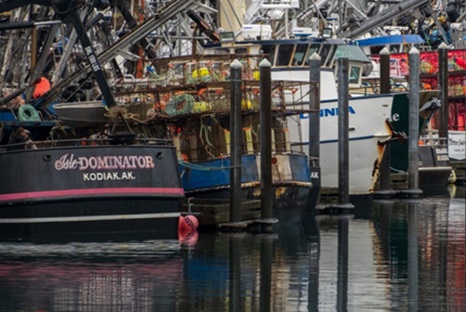
Alaska: Sen. Stevens says more details forthcoming on state insurance pool for commercial fishermen
One of the ideas rising to the top of the Alaska Seafood Task Force’s forthcoming recommendations is an insurance pool for commercial fishermen. The state legislative task force plans to release a full list of a dozen potential bills next month to address a downturn in the seafood market. But the group’s chairperson shared some information in advance with the Kodiak Fisheries Work Group on Dec. 18. State Senator Gary Stevens of Kodiak told members of the Kodiak Island Borough Assembly and City Council that he would like to use a model the Alaska Municipal League is using for sharing its communities’ insurance costs. This is known as the Alaska Municipal League Joint Insurance Association (AMLJIA), which is a self-insurance pool owned and paid for by the municipalities and school districts that make up its membership. more, >>CLICK TO READ<< 08:53
From fish traps to factory trawlers — A ‘back to the future’ look at Seattle’s fishing industry
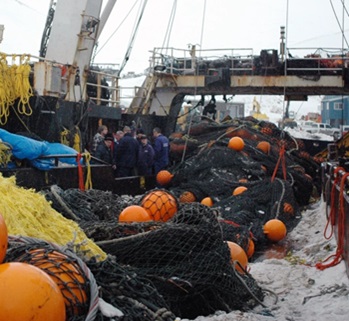 An advertiser-sponsored article in the Seattle Times gushed “Wild Alaska pollock’s fishing fleet is based right here in Seattle although all of the fish are caught in U.S. waters off of the coast of Alaska. This fishery benefits the economic growth of the entire region, including the North Pacific Fishing Fleet.” That includes 300 commercial fishing vessels of which 226 fish in Alaska. Many of the boats are huge catcher-processors — factory trawlers — that target pollock, cod, rockfish, flounders and other “groundfish” species. Alaska pollock alone is a 3 billion-pound fishery worth roughly $2 billion. And every year, the Seattle trawlers take home up to 76% of the value of ALL groundfish caught in the Bering Sea and Gulf of Alaska. It’s not a new scenario. Starting in 1885 and until Alaska became a state in 1959, Seattle companies used big traps to catch salmon throughout the territory. more, >>CLICK TO READ<< 10:55 By Laine Welch
An advertiser-sponsored article in the Seattle Times gushed “Wild Alaska pollock’s fishing fleet is based right here in Seattle although all of the fish are caught in U.S. waters off of the coast of Alaska. This fishery benefits the economic growth of the entire region, including the North Pacific Fishing Fleet.” That includes 300 commercial fishing vessels of which 226 fish in Alaska. Many of the boats are huge catcher-processors — factory trawlers — that target pollock, cod, rockfish, flounders and other “groundfish” species. Alaska pollock alone is a 3 billion-pound fishery worth roughly $2 billion. And every year, the Seattle trawlers take home up to 76% of the value of ALL groundfish caught in the Bering Sea and Gulf of Alaska. It’s not a new scenario. Starting in 1885 and until Alaska became a state in 1959, Seattle companies used big traps to catch salmon throughout the territory. more, >>CLICK TO READ<< 10:55 By Laine Welch






 A Southeast Alaska commercial fisherman was sentenced today to six months in prison for falsifying fishing records in violation of the Lacey Act and illegally taking a sperm whale in violation of the Endangered Species Act. According to court documents, between October and November 2020, Dugan Paul Daniels, 55, of Coffman Cove, knowingly submitted false records about his commercial fishing activities to make it appear that he lawfully caught sablefish, aka “black cod,” in federal waters on two separate occasions. An investigation revealed he harvested the fish illegally in State of Alaska waters, specifically, in Chatham Strait and Clarence Strait, respectively. The total market value of the illegally harvested fish was $127,528.
A Southeast Alaska commercial fisherman was sentenced today to six months in prison for falsifying fishing records in violation of the Lacey Act and illegally taking a sperm whale in violation of the Endangered Species Act. According to court documents, between October and November 2020, Dugan Paul Daniels, 55, of Coffman Cove, knowingly submitted false records about his commercial fishing activities to make it appear that he lawfully caught sablefish, aka “black cod,” in federal waters on two separate occasions. An investigation revealed he harvested the fish illegally in State of Alaska waters, specifically, in Chatham Strait and Clarence Strait, respectively. The total market value of the illegally harvested fish was $127,528.  DOGE Alaska has uncovered a massive federal grant to the Sitka Tribe of Alaska so that its members can buy king crab and king salmon from local fishermen, with the stated priority of buying from commercial fishermen who are also tribal members. That way the money circulated back into the tribe. The $2.4 million grant award came from the Department of Agriculture in a grant program intended to help “socially disadvantaged farmers and ranchers.” The grant awarded to the Sitka tribe allows 1,000 tribal households the ability to buy king crab, Dungeness crab, shrimp, salmon, and halibut from local commercial fishermen through a contact by the Sitka Tribe. This is not subsistence, and it’s not SNAP benefits (although people can buy king crab with their EBT cards), but is supposed to ensure greater food security for the members of the tribe, by allowing them to get free seafood right off the boats.
DOGE Alaska has uncovered a massive federal grant to the Sitka Tribe of Alaska so that its members can buy king crab and king salmon from local fishermen, with the stated priority of buying from commercial fishermen who are also tribal members. That way the money circulated back into the tribe. The $2.4 million grant award came from the Department of Agriculture in a grant program intended to help “socially disadvantaged farmers and ranchers.” The grant awarded to the Sitka tribe allows 1,000 tribal households the ability to buy king crab, Dungeness crab, shrimp, salmon, and halibut from local commercial fishermen through a contact by the Sitka Tribe. This is not subsistence, and it’s not SNAP benefits (although people can buy king crab with their EBT cards), but is supposed to ensure greater food security for the members of the tribe, by allowing them to get free seafood right off the boats. 


























